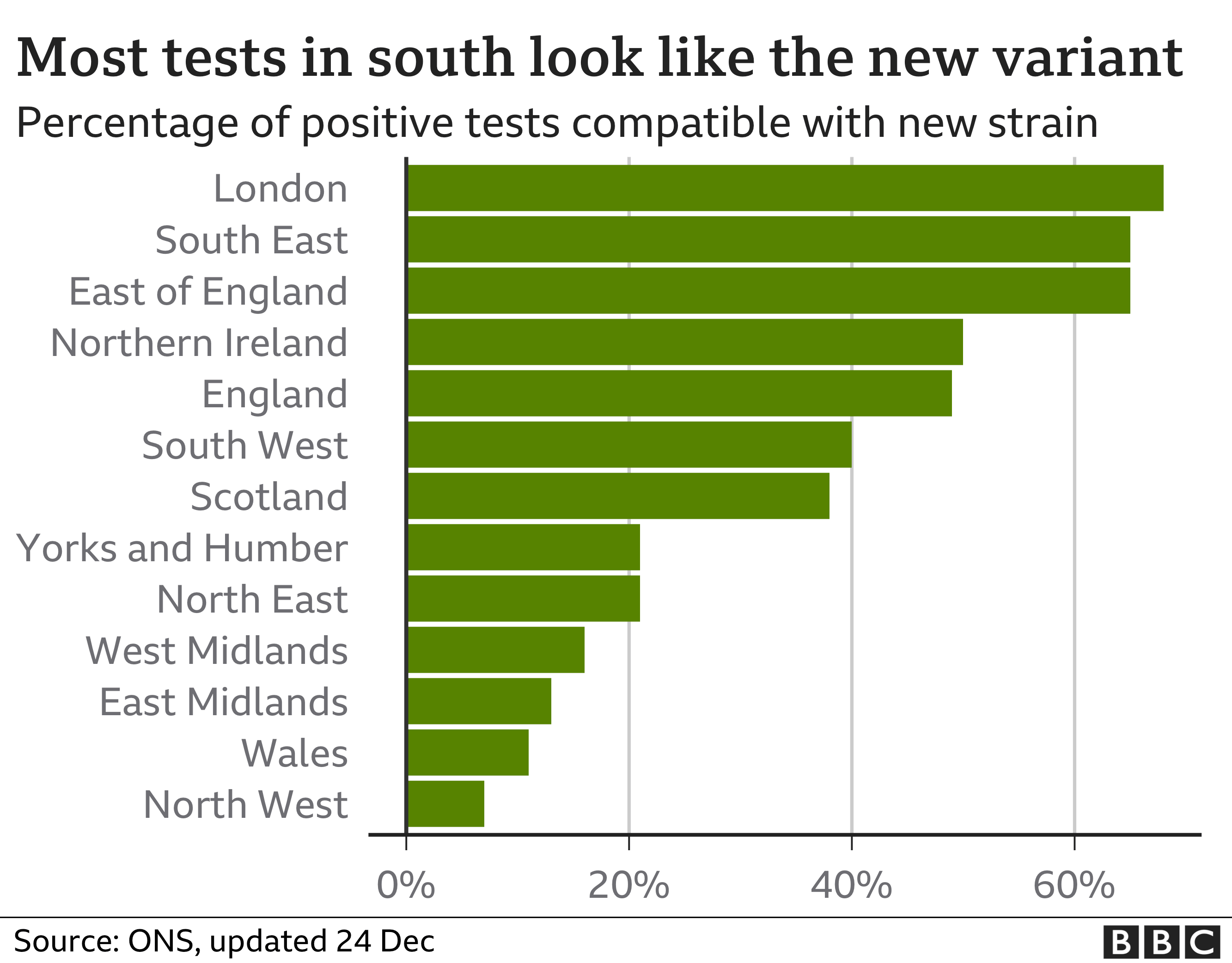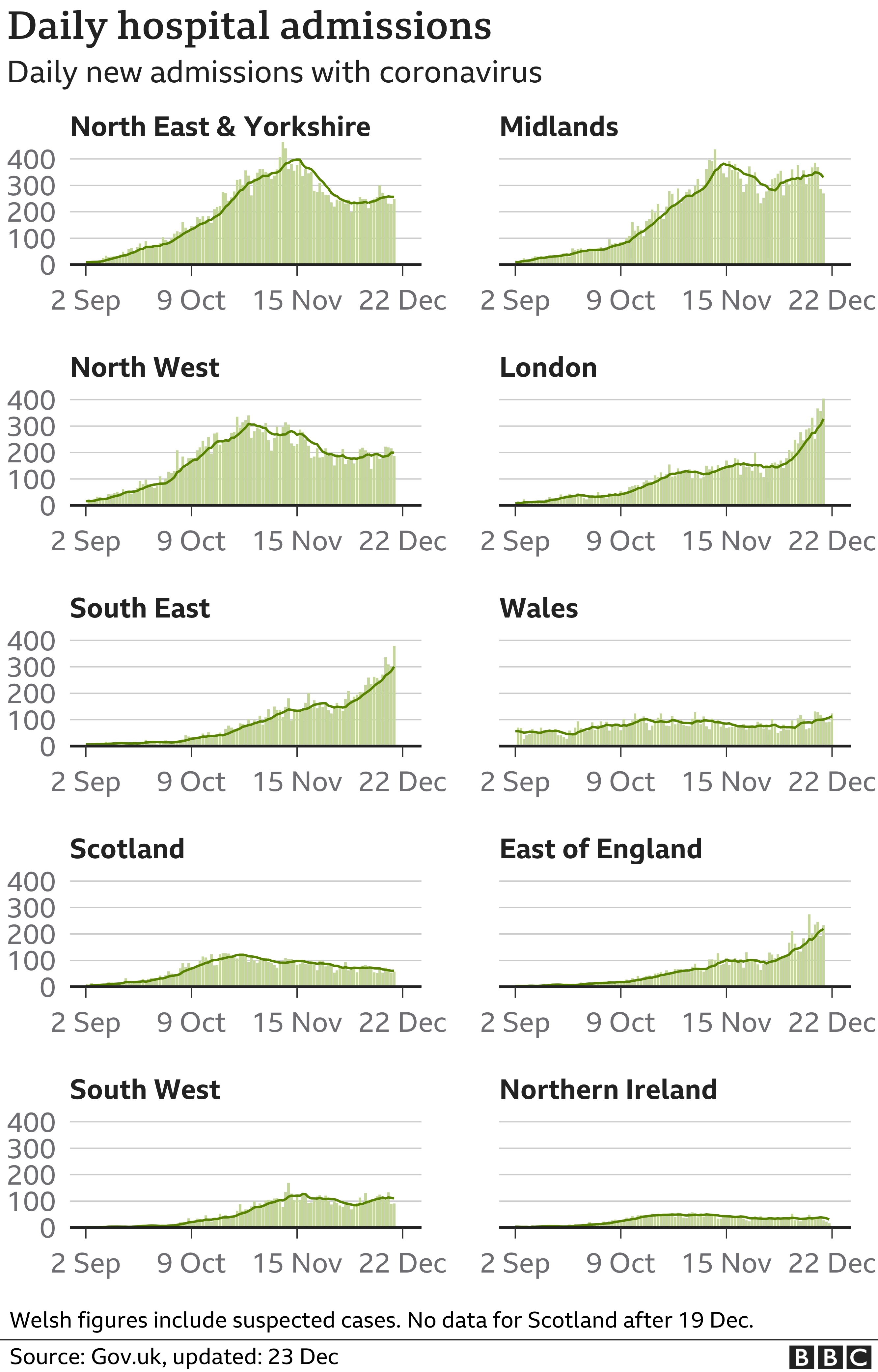England’s “very high” Covid infection level is a “growing concern” as the NHS struggles to cope with rising patient numbers, a health official has said.
On Monday, a further 41,385 Covid cases and 357 deaths were reported in the UK.
Some data for Scotland and Northern Ireland is not being released over the Christmas period.
Dr Yvonne Doyle, medical director at Public Health England, said: “Despite unprecedented levels of infection, there is hope on the horizon.”
She urged members of the public to “continue to play our part in stopping the spread of the virus” as the Pfizer/BioNTech coronavirus vaccine is rolled out.
“This very high level of infection is of growing concern at a time when our hospitals are at their most vulnerable, with new admissions rising in many regions,” Dr Doyle said in a statement.
Monday’s figure for new cases is the highest daily number reported by the UK government, and the first time the daily total has surpassed 40,000.
However, it is thought the infection rate was much higher during the first peak in April – but testing capacity was too limited to detect the true number.
‘We cope at a cost’
Scotland is not releasing data around deaths between 24 and 28 December, while Northern Ireland is not providing either case or death data.
There were 21,286 people in hospital with coronavirus across the UK on 22 December – the last day for which data is available – according to government figures.
Hospitals in Wales, Scotland and the south of England have reported a rising pressure on their services as the number of Covid patients rises.
The president of the Royal College of Emergency Medicine said she saw “wall to wall Covid” when she worked at one London hospital on Christmas Day.
Dr Katherine Henderson told the BBC there was a “great deal of difficulty” getting patients into wards.
She added: “The chances are that we will cope, but we cope at a cost – the cost is not doing what we had hoped, which is being able to keep non-Covid activities going.
“It is always challenging in winter, nobody would say that it wasn’t, but at the moment the level of patient need is incredibly high.”
- Covid hospital pressures in Wales ‘incredibly challenging’
- NHS faces being ‘overwhelmed’ warn health leaders
About half of the health boards in Wales have already cancelled non-urgent care, according to the director of the Welsh NHS Confederation.
Darren Hughes told BBC Radio 4’s PM programme the situation in Welsh hospitals was “incredibly serious, and worsening”, with some intensive care units already at capacity.
Public Health Wales’ Dr Giri Shankar said large numbers of patients, and staff sickness, have created an “incredibly challenging” situation.
And doctors have warned Scotland’s health system is “severely stretched”.
Infection rates in England are currently highest in areas of Essex, London and other parts of the South East.
Parts of Essex have recorded the highest weekly coronavirus case rates since the pandemic began. In the week leading up to 21 December, Brentwood, Epping Forest and Thurrock all had rates of more than 1,350 cases per 100,000 people.
The chief executive of Homerton hospital in east London urged people to comply with the tier four restrictions in force.
In a tweet, Tracey Fletcher wrote: “We are extremely busy… our nurses and doctors are incredibly stretched caring for very sick patients. No-one should underestimate the impact the infection can have.”

Patricia Marquis, regional director of the Royal College of Nursing in south-east England, said the number of beds and staff available at hospitals in her area was “really close to the edge”.
“We are getting to the point where it does feel like there is a possibility that hospitals will become overrun,” she told Radio 4’s PM programme.
Ms Marquis said the strain on staffing meant nurses were looking after “far more patients” than usual and “it does feel unsafe at times for them”.
“The pressure on staff is huge and keeping going, mentally, is really difficult for them,” she added.

Cabinet Office minister Michael Gove said the government’s tiered system for coronavirus rules in England was the “right strategy” but accepted the NHS was under pressure and there were “difficult months ahead”.
Some 24 million people in the south-east and east of England – about 43% of the population – are now living under the strictest tier four rules and a review on 30 December could see more areas placed under the restrictions.
Mainland Scotland entered level four restrictions from Saturday for three weeks, and similar rules are in place in Wales.
Northern Ireland has also entered a new six-week lockdown.
The BBC has been told the London Ambulance Service (LAS) received 7,918 emergency calls on 26 December – as many as at the height of the first wave of Covid-19.
An LAS memo said the rising demand was down to the “rapid spread of the new variant of the Covid-19 virus”.
Figures seen by the BBC show at one London hospital on Sunday morning, ambulance crews were typically waiting nearly six hours to hand over patients to staff.

